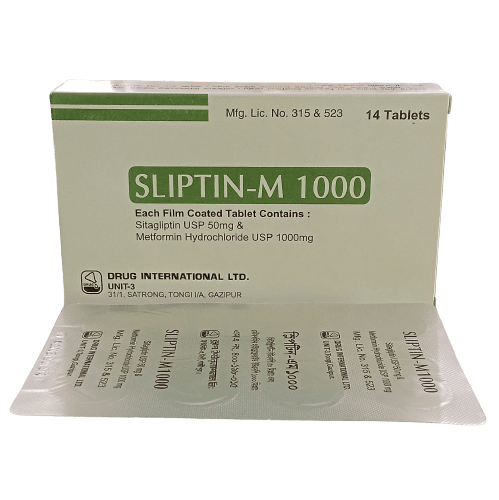
Type:7 Tablets
Generic Name:Metformin Hydrochloride + Sitagliptin
Manufacturer:Drug International Ltd.
Price:৳133.00
Type 2 DM
Should be taken with food.
Oral Type 2 DM The recommended starting dose in patients not currently treated with Metformin Initially 50 mg/500 mg bd. The starting dose in patients already treated with Metformin should provide sitagliptin dosed as 50 mg twice daily (100 mg total daily dose) and the dose of Metformin already being taken. For patients taking Metformin 850 mg twice daily, the recommended starting dose of this combination is 50 mg Sitagliptin/1000 mg Metformin hydrochloride twice daily. May adjust the dosing based on effectiveness and tolerability. Max daily dose: Sitagliptin 100 mg/metformin 2000 mg. Extended Release Tablet: Initially: Sitagliptin 50 mg or 100 mg/metformin extended-release 500 mg or 1,000 mg. Administer once daily with meal preferably in the evening. Gradually escalate the dose twice daily if needed. Max daily dose: Sitagliptin 100 mg/metformin extended-release 2000 mg. Hepatic impairment: Do not administer
<18 years: Safety and efficacy not established
Renal impairment Obtain eGFR before starting metformin eGFR <30 mL/min/1.73 m²: Contraindicated eGFR 30-45 mL/min/1.73 m²: Not recommended to initiate treatment Monitor eGFR at least annually or more often for those at risk for renal impairment (eg, elderly) If eGFR falls below 45mL/min/1.73 m² while taking metformin, risks and benefits of continuing therapy should be evaluated If eGFR falls below 30 mL/min/1.73 m²: while taking metformin, discontinue the drug
Renal dysfunction, e.g., serum creatinine >1.5 mg/dL [males], >1.4 mg/dL [females] or abnormal creatinine clearance. Metabolic acidosis, including diabetic ketoacidosis. History of a serious hypersensitivity reaction (e.g., anaphylaxis or angioedema) to Sitagliptin + Metformin or to one of its components.
Sitagliptin: Dipeptidyl peptidase 4 (DPP-4) inhibitor, thereby increasing and prolonging incretin hormone activity which are inactivated by DPP-4 enzyme. Incretins increase insulin release and synthesis from pancreatic beta cells and reduce glucagon secretion pancreatic alpha cells. Metformin: Biguanide; acts by decreasing endogenous hepatic glucose production, decreases intestinal absorption of glucose, and improves insulin sensitivity by increasing peripheral glucose uptake and utilization; improves glucose tolerance and lowers both basal and postprandial plasma glucose .
Not for use in type 1 DM or treatment of ketoacidosis. Discontinue use if pancreatitis is suspected. Renal & hepatic impairment. Sulfonylurea- or insulin-induced hypoglycemia, risk of lactic acidosis, hypoxic states, surgical procedures, alcohol intake, decreased vit B12 absorption, loss of glycemic control. Pregnancy. Elderly. Childn <18 yr. Lactation: not known if crosses into breast milk, use caution Pregnancy Categories
1-10% Abdominal pain (2.2%),Diarrhea (2.4%),Hypoglycemia (2.1%),Nausea (1.3%),Vomiting (1.1%) Frequency Not Defined Exfoliative disorder of skin of scalp,Stevens-Johnson syndrome,Lactic acidosis (rare ),Anaphylaxis/hypersensitivity reaction,Rhabdomyolysis,Acute renal failure,Angioedema
Additive effect w/ sulfonylureas. Thiazide diuretics, corticosteroids, phenothiazines, OC, sympathomimetics, niacin, Ca channel blockers and isoniazid may exacerbate loss of glycaemic control. ACE inhibitors may reduce fasting blood glucose concentrations. May increase serum level w/ cimetidine. Potentially Fatal: Concurrent use w/ iodinated contrast agents may increase the risk of metformin-induced lactic acidosis.